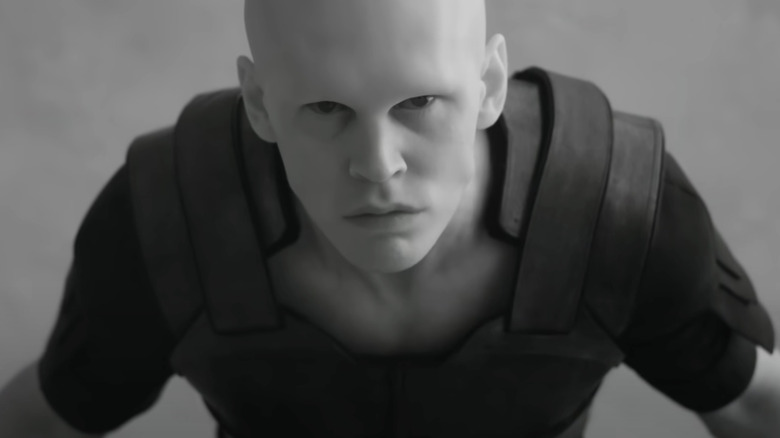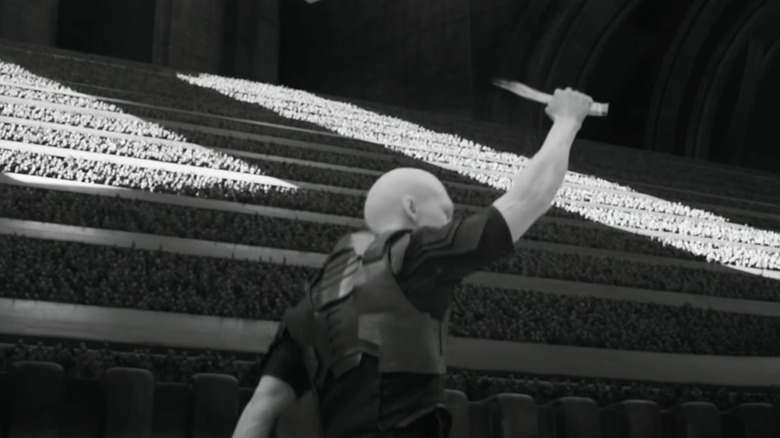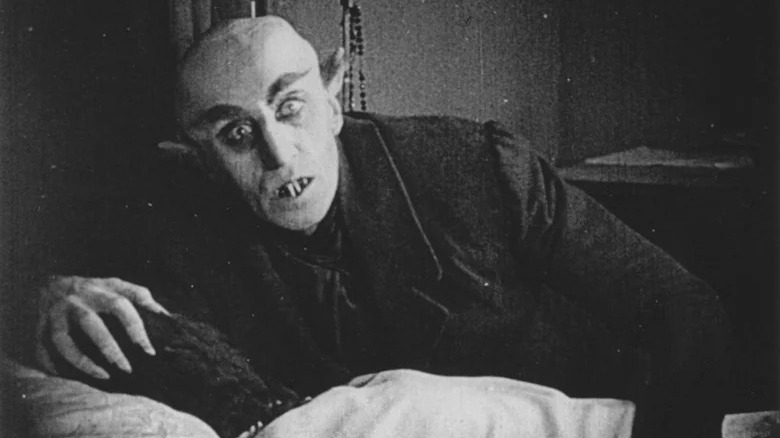The Look Of Harkonnen People In Dune 2 Was Influenced By A Classic Horror Movie
We may receive a commission on purchases made from links.
Now that "Dune: Part Two" has crossed box office milestones and set up director Denis Villenueve to keep the spice flowing with a forthcoming "Dune 3," we can forget all about claims that Frank Herbert's original "Dune" novel was "unfilmable." We no longer need to worry that Villeneuve's adaptation would be too arcane and dense with sci-fi lore to appeal to mass audiences. We can simply take in his "Dune" duology for the breathtaking spectacle that it is.
The "Dune" discourse will likely veer toward the forthcoming threequel and the "Dune: Prophecy" series, set to hit Max this fall, but in the meantime, Villeneuve can simply revel in his latest blockbuster's success. But this isn't just a commercial win for Villeneuve. The French Canadian director has, along with cinematographer Greig Fraser and production designer Patrice Vermette, achieved technical feats with the "Dune" films, creating cinematic environments that feel realistically otherworldly. These feats include having his VFX team create whole new techniques for the hologram scenes and shooting entire sequences in infrared.
The infrared scenes, which only appear in "Dune: Part Two," are particularly noteworthy for giving us a glimpse of the exterior environs of the planet Geidi Prime, home to the villainous House Harkonnen. Whereas "Dune" only showed us interior shots from this planet, "Part Two" introduced Austin Butler's ruthless assassin Feyd-Rautha in an outdoor black-and-white sequence wherein he faces off against several combatants in the Harkonnen arena. As Stellan Skarsgård's Baron Vladimir Harkonnen looks on, Feyd-Rautha demonstrates his lethal skills in front of hundreds of thousands of Harkonnen spectators, all of which was shot using infrared to depict a planet overseen by a black sun.
What makes these scenes interesting, beyond Fraser's use of infrared, however, is that there was actually a heavy yet subtle horror influence at work.
Look closer at the crowd in Dune: Part Two's arena scene
We already know that Patrice Vermette took inspiration from a wide array of sources when designing the various elements of the "Dune" films, from sets inspired by Rolex watches to septic-tank-influenced architecture for the Harkonnen structures. But when it came to the Feyd-Rautha introduction, while Greig Fraser was handling the overall visuals, and Vermette had the architecture covered, costume designer Jacqueline West still had to worry about those thousands of Harkonnen onlookers.
In the book "The Art and Soul of Dune: Part Two," authors Tanya Lapointe and Stefanie Broos recount how the Arena scene was important as it was the first time audiences saw Geidi Prime in the daytime. According to the book, Villeneuve's overall guidance for these scenes was that "This will be a world in which sunlight kills color." But West needed more to go on when it came to visualizing the Harkonnen civilians.
According to Lapointe and Broos, when West asked "What do Harkonnen civilians look like?", Villeneuve firstly described them as "a homogenous group of men and women with similar body types, all wearing the same style of clothing." But it was his last piece of advice that really gave these faceless crowd members their ominous aura: "Like a crowd of nosferatu," he added.
The Nosfaratu influence on the Harkonnens is inspired
When talking about his decision to make Feyd-Rautha bald in "Dune: Part Two," Denis Villeneuve said:
"I loved the idea that Harkonnens are a society that doesn't like hair. [...] They remove everything. They want to be as far away from any part of their past as possible, where they are coming from. There's a will of purity."
But there's no doubt these pale, hairless figures project much more than a sense of purity. There's an undeniably sinister element to their appearance, which is even the case for Léa Seydoux's Lady Margot Fenring, who, like Baron Harkonnen, watches Feyd-Rautha's arena battle from whatever the Geidi Prime equivalent of a sky box is. Obviously, these characters are the antagonists, so it makes sense for them to have such a menacing look. But it's interesting to discover that Villeneuve had Nosferatu in mind here.
The character has been a horror icon ever since F.W. Murnau's unauthorized 1922 "Dracula" adaptation "Nosferatu: A Symphony of Horror." That same story will soon be remade by filmmaker Robert Eggers, whose upcoming "Nosferatu" is, according to the director, a gothic horror movie that will actually scare us all. While I hadn't made the connection between the pallid visage of this 1920s screen monster and the Harkonnens, now that I see it, the crowds in the arena scenes really do take on a much more eerie and unsettling aspect. Combined with the surreal effect of the infrared cinematography and the ominous score, the whole thing makes for an effective sense of foreboding that stands as one of Villeneuve and his collaborator's finest "Dune" achievements.


